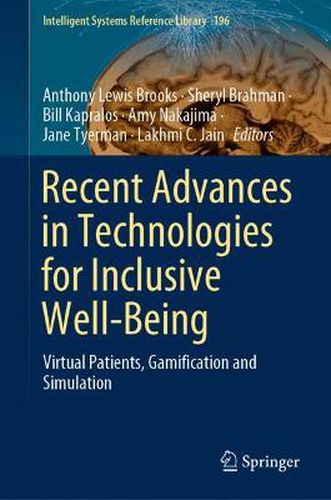Readings Newsletter
Become a Readings Member to make your shopping experience even easier.
Sign in or sign up for free!
You’re not far away from qualifying for FREE standard shipping within Australia
You’ve qualified for FREE standard shipping within Australia
The cart is loading…






This title is printed to order. This book may have been self-published. If so, we cannot guarantee the quality of the content. In the main most books will have gone through the editing process however some may not. We therefore suggest that you be aware of this before ordering this book. If in doubt check either the author or publisher’s details as we are unable to accept any returns unless they are faulty. Please contact us if you have any questions.
In a time of ongoing pandemic when well-being is a priority this volume presents latest works across disciplines associated to Virtual Patients, Gamification and Simulation. Chapters herein present international perspectives with authors from around the globe contributing to this impactful third edition to the series following a 2014 Springer book on Technologies for Inclusive Well-Being and a 2017 Springer book Recent Advances in Technologies for Inclusive Well-Being.
Digital technologies are pervasive in life and the contributions herein focus on specific attributes and situations, especially in training and treatment programmes spanning across ranges of diagnosis, conditions, ages, and targeted impacts. This volume purposefully does not cover all (even if that was possible) aspects on how virtual interactive space can align to statial computing, which in turn can align with related embodied entities (whatever the terms used e.g. Virtual, Augmented, Extended, Mixed Realities) along with AI, Deep Learning etc. It also doesn’t cover what some may refer to as ‘trendy terms’ such as 360 degree, video, WebXR, cryptocurrency, blockchain, virtual goods, AR museums, travel and teleportation…however, what is covered in this book, and the prior volumes it builds upon (as above), is a sharing and questioning of advancing technologies for inclusive well-being through research and practices from an avant-garde perspective.
$9.00 standard shipping within Australia
FREE standard shipping within Australia for orders over $100.00
Express & International shipping calculated at checkout
Stock availability can be subject to change without notice. We recommend calling the shop or contacting our online team to check availability of low stock items. Please see our Shopping Online page for more details.
This title is printed to order. This book may have been self-published. If so, we cannot guarantee the quality of the content. In the main most books will have gone through the editing process however some may not. We therefore suggest that you be aware of this before ordering this book. If in doubt check either the author or publisher’s details as we are unable to accept any returns unless they are faulty. Please contact us if you have any questions.
In a time of ongoing pandemic when well-being is a priority this volume presents latest works across disciplines associated to Virtual Patients, Gamification and Simulation. Chapters herein present international perspectives with authors from around the globe contributing to this impactful third edition to the series following a 2014 Springer book on Technologies for Inclusive Well-Being and a 2017 Springer book Recent Advances in Technologies for Inclusive Well-Being.
Digital technologies are pervasive in life and the contributions herein focus on specific attributes and situations, especially in training and treatment programmes spanning across ranges of diagnosis, conditions, ages, and targeted impacts. This volume purposefully does not cover all (even if that was possible) aspects on how virtual interactive space can align to statial computing, which in turn can align with related embodied entities (whatever the terms used e.g. Virtual, Augmented, Extended, Mixed Realities) along with AI, Deep Learning etc. It also doesn’t cover what some may refer to as ‘trendy terms’ such as 360 degree, video, WebXR, cryptocurrency, blockchain, virtual goods, AR museums, travel and teleportation…however, what is covered in this book, and the prior volumes it builds upon (as above), is a sharing and questioning of advancing technologies for inclusive well-being through research and practices from an avant-garde perspective.